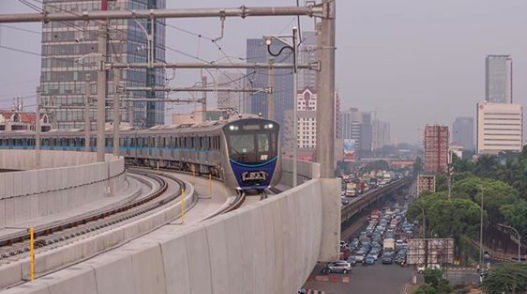For those of us living in Jakarta, it feels like construction on (and the resultant traffic from) the first phase of the capital’s mass rapid transit (MRT) system has been going on forever. But there’s light at the end of that tunnel, with officials saying phase 1 will be operational in March 2019. But how about phases 2 and 3?
According to William Sabandar, the president director of state-owned PT MRT Jakarta, work on phase 2 will start by the end of this year. And unlike phase 1, all of the MRT train lines built during the second phase will be located underground.
The furthest point phase 2 will reach is Kampung Bandan in Mangga Dua, near the border of North and Central Jakarta, which is located around 7.8 kilometers from the Hotel Indonesia Roundabout, which will serve as the MRT’s central hub.
“For phase 2, our target is for it to be completed by 2024, in 2025 it will start operating,” William said in Jakarta Wednesday as quoted by Kompas.
After that, PT MRT Jakarta plans to build phase 3 of the MRT, which will cover a much wider range of 87 kilometers, reaching all the way to Banten province and Cikarang in West Java. PT MRT would only be in charge of the 31 kilometers located within the greater Jakarta Metropolitan area though, with regional governments in charge of implementing their connections to the system.
Harry did not give estimated dates for phase 3 but did say that it would be the last major phase of construction, with the first three acting as the backbone of the system for any later additions.
PT MRT Jakarta previously announced that the first phase of the MRT, connecting Lebak Bulus in South Jakarta to Hotel Indonesia Roundabout in Central Jakarta, will be open to the public by March 2019. It is currently in the testing phase with one last major month long trial set for mid-February.
Officials say the MRT will operate daily from 5 am to 12 pm, with trains passing each station every five minutes during busy periods (6 am to 9 am and 4 pm to 7 pm) and every 10 minutes for the rest of the day. There’s no word yet on how much tickets will cost.
Much hope has been placed on the MRT to alleviate the capital’s traffic woes. Minister of National Development Planning Bambang Brodjonegoro said last year that Jakarta’s macet — a consequence of the city’s lateness in constructing rail-based transportation systems like the MRT — costs the country US$5 billion each year in lost productivity.
The MRT has seen some delays in the past few years, having been previously targeted for completion in 2018 in times for the Asian Games that were co-hosted by Jakarta in August and September.




